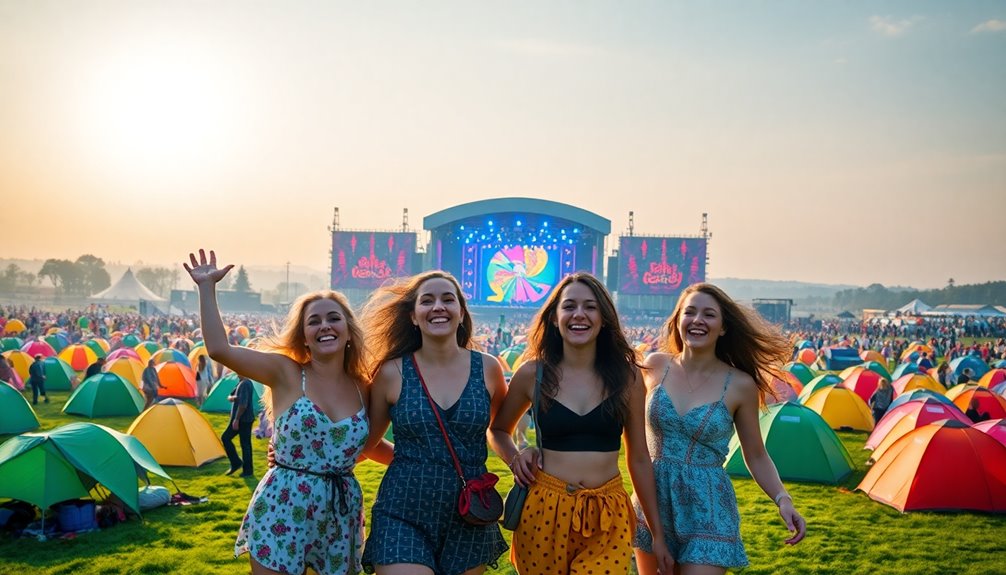The Glastonbury Festival is a cultural phenomenon that transforms Worthy Farm into a vibrant hub of music and art. It began in 1970, inspired by the Bath Festival of Blues, and has grown to attract around 210,000 attendees annually. With an eclectic mix of performances, from rock legends to contemporary acts, it emphasizes inclusivity and sustainability. You'll also uncover its unique history, iconic stages, and the community spirit that makes it so special.
Key Takeaways
- Glastonbury Festival, founded in 1970, has evolved into a cultural icon, showcasing diverse music genres and attracting over 210,000 attendees annually.
- The festival promotes inclusivity, featuring dedicated spaces for marginalized groups and a range of performances beyond music, including comedy and theatre.
- Sustainability initiatives, such as banning single-use plastics and implementing recycling programs, highlight Glastonbury's commitment to environmental stewardship and community responsibility.
- Its exciting ticket acquisition process fosters anticipation and community engagement, enhancing the overall festival experience for attendees.
- Glastonbury's future includes innovative virtual reality tickets and a continued focus on artistic exploration, positioning it as a leader in live events.
History and Origins of Glastonbury Festival
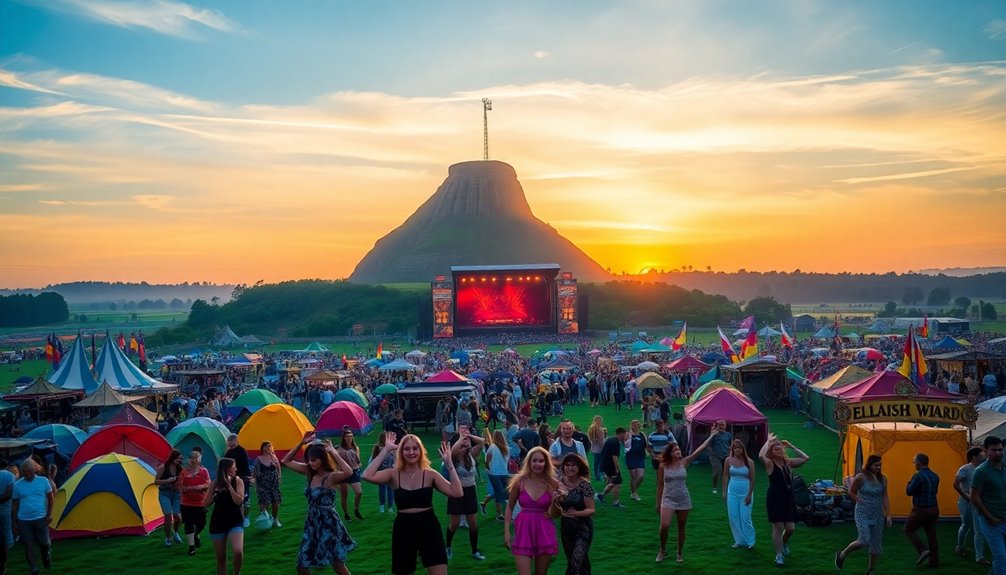
When you explore the history and origins of the Glastonbury Festival, you'll find it all began in 1970, inspired by the Bath Festival of Blues and Progressive Music.
Michael Eavis, an English dairy farmer, organized the first event after witnessing legendary performances, including Led Zeppelin. The inaugural Pilton Pop, Folk and Blues Festival attracted 1,500 attendees, with tickets priced at just £1, including free camping and milk.
It opened the day after Jimi Hendrix's death, featuring T. Rex as the headliner. By 1971, it was renamed Glastonbury Fayre, showcasing the iconic Pyramid Stage.
Though the festival faced a hiatus from 1972 to 1978, it eventually returned, paving the way for its evolution into a cultural phenomenon.
The Location: Worthy Farm
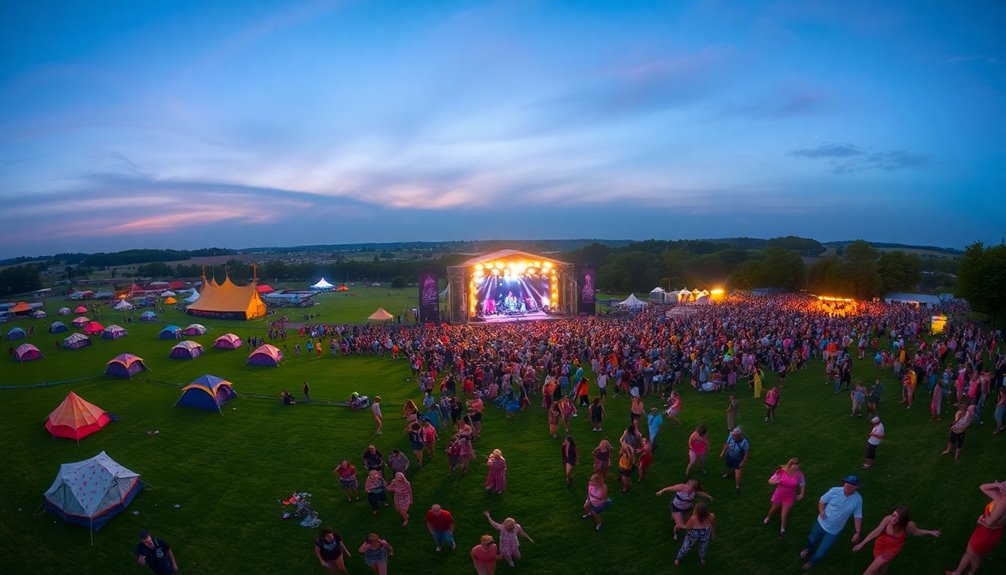
The Glastonbury Festival's vibrant atmosphere is deeply rooted in its unique location at Worthy Farm. Nestled in a valley at the head of the Whitelake River, this 1,100-acre site near Pilton, Somerset, offers stunning natural beauty between two limestone ridges.
Just three miles from Shepton Mallet, it's easily accessible, yet feels like a world away. The festival showcases iconic stages like the Pyramid Stage, alongside attractions like acoustic and comedy tents. Over the years, the festival has attracted around 200,000 attendees each year, creating an incredible sense of community and shared experience.
With its spiritual significance and ley lines converging on Glastonbury Tor, Worthy Farm isn't just a venue; it's a place where music, nature, and community come together.
Plus, its commitment to sustainability highlights the festival's respect for the environment and the land.
Diverse Music and Performances

As you step into the vibrant world of Glastonbury Festival, you'll find a captivating array of musical genres that cater to diverse tastes and preferences.
From rock legends like David Bowie and The Rolling Stones to contemporary acts like K-Pop's Seventeen, the lineup is ever-evolving. The festival showcases everything from electronic beats at The Glade stage to the unique sounds of South London pub-rockers Squeeze. This year, the festival featured a blend of new elements and familiar favorites that delighted attendees.
But it doesn't stop at music; you'll experience comedy, circus acts, and theatre performances that enhance the atmosphere.
Inclusivity is key, with dedicated spaces for marginalized groups and accessibility measures in place. This celebration of diversity truly makes Glastonbury a cultural phenomenon that resonates with everyone.
Attendance and Popularity Trends
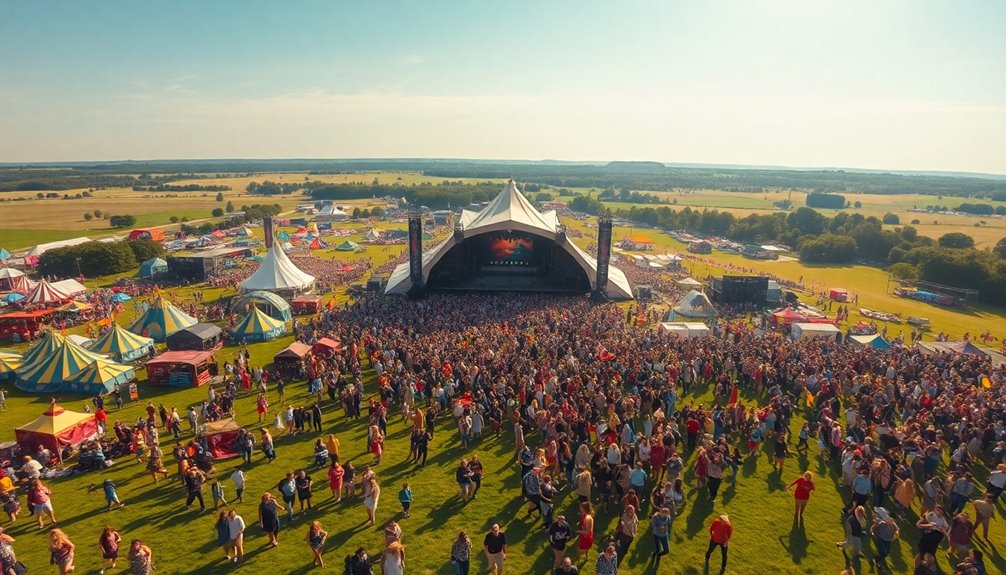
With an impressive annual attendance of around 210,000, Glastonbury Festival has solidified its status as one of the UK's most popular cultural events. This festival attracts a diverse crowd, with 52% of attendees being male and a strong presence of millennials aged 25-34. Tickets sell out quickly, often within hours, reflecting its immense popularity. Notably, about 5,000 attendees hail from North East England, showcasing regional loyalty. Approximately 5,000 attendees from the North East also emphasizes the festival's appeal beyond just local boundaries. The festival also boasts a significant online presence, with an average monthly search volume of 98,600 in 2023, and it dominates social media during the event. Efforts to attract younger audiences have succeeded, making Glastonbury a vibrant mix of tradition and contemporary culture.
Environmental Impact and Sustainability Initiatives
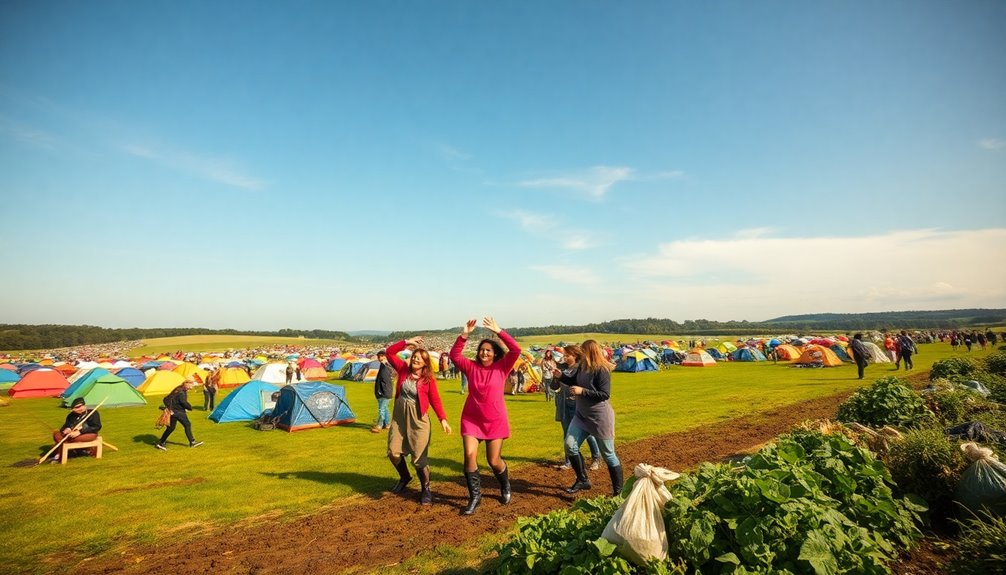
Glastonbury Festival's immense popularity brings significant environmental challenges, particularly given its annual attendance of around 210,000.
Each year, the festival produces over 2,000 tonnes of waste, but thanks to sustainability initiatives, it saves nearly 600 tonnes of greenhouse gas emissions. The festival has banned single-use plastic bottles since 2019, promotes electric vehicles, and harnesses renewable energy sources like solar and wind. Impressively, half of the waste generated is recycled or reused, with over 68 tonnes of paper and card recycled annually. The tree-planting program has seen 10,000 trees planted since 2000, enhancing its net positive environmental impact, contributing to main emissions offsets from tree planting.
Cultural and Social Impact on Attendees
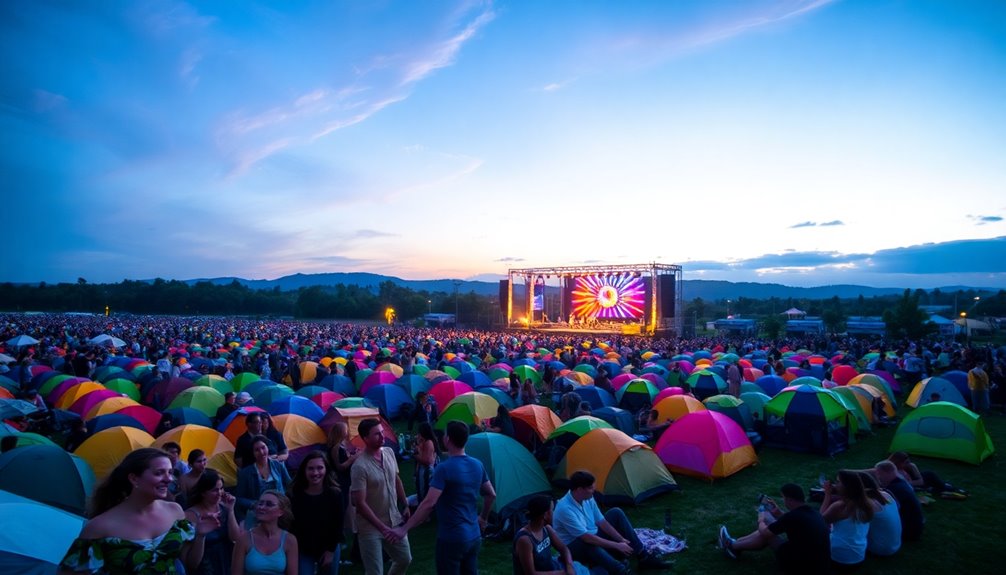
While attending Glastonbury Festival, you enter a unique realm that transcends ordinary life, fostering a powerful sense of connection among attendees.
In this liminal space, traditional social norms relax, allowing spontaneous interactions and the formation of strong bonds with fellow festival-goers. You'll find that music acts as the social glue, uniting people from diverse backgrounds. This shared experience cultivates a collective identity, enhancing your sense of community. As you navigate this temporary autonomous zone, you become part of a countercultural ethos that encourages political and social issues activism.
The festival's low crime rates and health initiatives reflect the respect and care among attendees, leaving you with lasting memories and a greater sense of interconnectedness long after the event ends.
Iconic Stages and Their Significance
As you explore the grounds of the festival, you'll quickly notice the iconic stages that define Glastonbury's landscape and its cultural essence.
The Pyramid Stage, a towering 30m steel structure, serves as the festival's heart, hosting legendary acts like Beyoncé and The Rolling Stones. Its design, inspired by the Great Pyramid of Giza, emphasizes a powerful geometric shape that resonates with natural energy.
Nearby, the Other Stage offers a grittier vibe with big-name artists, while the West Holts Stage immerses you in global rhythms like funk and soul.
Don't miss the John Peel Stage, where emerging talent often surprises the audience.
The Park Stage, with its stunning views, showcases both established and new artists, enhancing your experience.
Each stage reflects Glastonbury's rich musical heritage and its commitment to creativity and community engagement.
The Role of Charity and Community Support
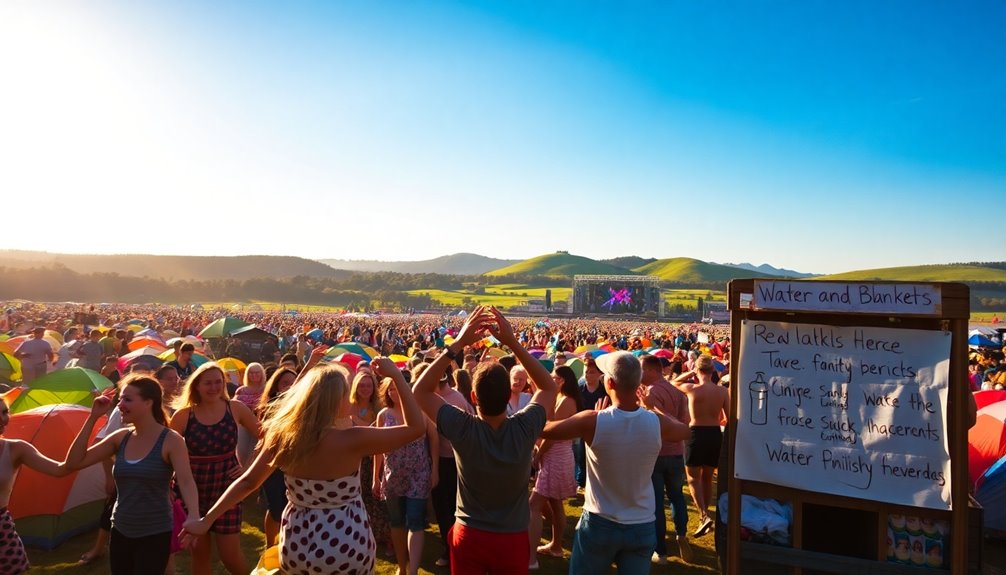
The vibrant atmosphere of Glastonbury Festival goes beyond music, showcasing a deep commitment to charity and community support. You'll find long-standing partners like Oxfam, WaterAid, and Greenpeace working alongside local initiatives that enrich schools and support community food banks. In 2024, the festival donated over £5.9 million to various causes, including a significant £2 million to the NHS Somerset Charity. Notably, this marked an increase from the previous year's total of £3.7 million, highlighting the festival's increased charitable contributions. Special fundraising efforts, like the Crowdfunder appeal, raised crucial funds for organizations like the British Red Cross and War Child.
The Future of Glastonbury Festival

With a commitment to sustainability and innovation, Glastonbury Festival is poised to shape the future of live events.
You'll experience a festival that emphasizes renewable energy, with efforts to power all production areas using solar and other eco-friendly sources. As you arrive, you might notice over 100,000 attendees opting for sustainable travel options, making a positive environmental impact. This year, the ticket acquisition process adds excitement to the festival experience as fans engage in the rush to secure their spots. The festival's focus on renewable energy sources aligns with a growing global movement towards environmental responsibility.
Glastonbury's ban on single-use plastics and its on-site recycling plant highlight its dedication to waste management.
In the coming years, expect technological advancements like virtual reality tickets and enhanced digital connectivity, enriching your experience.
With diverse line-ups and innovative performances, the festival will continue to be a transformative cultural event, fostering community and creativity while prioritizing sustainability.
Frequently Asked Questions
What Should I Bring When Attending Glastonbury Festival?
When you're heading to a festival, make sure you've got your essentials covered.
Bring a sturdy tent and a large rucksack for your gear. Don't forget a warm sleeping bag and mat for comfort.
Pack waterproof clothing and wellies for unpredictable weather. A day bag, reusable water bottle, and snacks will keep you fueled.
Lastly, include toiletries, a first aid kit, and sunscreen to stay clean and protected during your adventure.
Are Children Allowed at Glastonbury Festival?
Yes, children are allowed at the festival!
Kids aged 12 and under don't need a ticket, while those aged 13 to 15 require a 'TEEN' ticket and must be accompanied by a responsible adult.
If you're bringing children under 16, you'll need to supervise them at all times.
There are plenty of activities for kids, like crafts and performances, ensuring a fun experience for the whole family!
How Can I Volunteer at Glastonbury Festival?
To volunteer at Glastonbury Festival, you'll need to apply early in the year—typically between late January and mid-February.
Use the Rosterfy system for your application. You'll pay a refundable deposit, and some roles might require prior experience.
After you're accepted, you'll enjoy camping, meal vouchers, and time to explore the festival.
Don't forget to express your skills and interests; they'll help match you with the right role!
What Accommodations Are Available Near Worthy Farm?
If you're looking for accommodations near Worthy Farm, you've got plenty of great options.
You can choose from luxury B&Bs like The Cross at Croscombe, comfortable inns such as The Lion at West Pennard, or convenient hotels like Premier Inn.
Self-catering spots in Mells offer kitchenettes for more flexibility, while relaxing farm stays like Knoll Hill Farm provide a peaceful environment.
Each option caters to different preferences and budgets, so you'll find something that suits you!
Is There Merchandise Available for Purchase at the Festival?
Yes, there's merchandise available for purchase at the festival.
You'll find a range of items, including clothing like T-shirts and hoodies, as well as accessories such as hats and badges.
There are also home goods, like mugs and posters.
While you can shop online through the official store, many stalls at the festival offer unique items, often featuring special designs.
Don't forget to check out those limited edition pieces!
Conclusion
In the grand tapestry of music festivals, Glastonbury isn't just a stitch; it's the entire loom! You've danced through mud and magic, experienced performances that could move mountains, and forged connections that last a lifetime. This cultural juggernaut isn't just an event; it's a cosmic celebration of humanity, creativity, and spirit. As you dream of future festivals, remember: Glastonbury isn't just a place; it's an unforgettable journey that transcends time and space!

